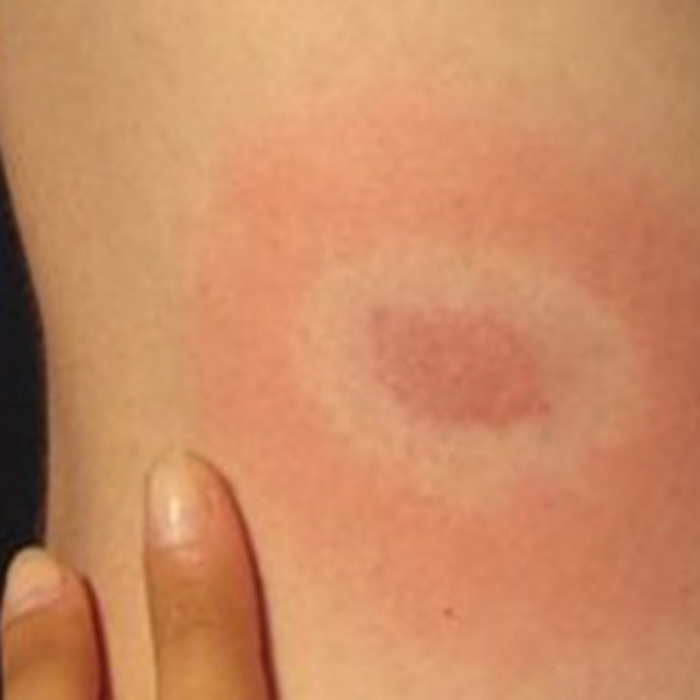 Distinctive bullseye rash which can be a signal of Lyme disease infection.
Distinctive bullseye rash which can be a signal of Lyme disease infection.
With proper precautions there is no reason local residents shouldn’t enjoy outdoor activity, said Medical Officer of Health Dr. David Colby.
Colby said there are have been five cases of Lyme disease reported in each of the last two years, but said there are likely more which aren’t recorded as being from Chatham-Kent.
“Rondeau Park is our endemic area,” he said. “It is likely there are cases of vacationers or summer residents who acquire the disease there but don’t seek treatment until they return home. In that case they would be reported in whatever area they come from.”
Colby said the ticks which attach themselves to hosts and transmit the bacteria, are most often found along the north shore of Lake Erie, but aren’t everywhere.
“We looked for ticks in the Wheatley area last year and didn’t find any.”
Ticks are most active in the spring when the nymph stage ticks feed voraciously.
The best way to avoid them is to make sure legs and feet are covered so they can’t attach themselves.
“Tucking your pant legs into your socks is a simple way to discourage ticks,” he said. “Make sure if you’re walking in low vegetation that you’re covered up.”
Colby said there are various tick repellants which can be effective when applied to clothing, however, he’s not convinced of the value of regular insect repellants.
Ticks are extremely small, “about the size of the head of a pin,” Colby said. If you find a tick that hasn’t attached itself, just brush it off.
“If you find a tick that has started to feed, remove it right away,” he said. “It takes 24 hours before the tick finishes feeding so the best course of action is to get medical attention. A doctor may prescribe medication which is very effective in treating Lyme disease, but the sooner you begin treatment the better.”
He said a typical bull’s eye rash is often a telltale sign of infection.
In addition to humans, 25 to 30 cases of canine Lyme disease are recorded each year locally.
Colby recommends “tick proofing” property by keeping lawns mowed and vegetation trimmed and away from buildings and childrens’ play areas.
He said despite claims to the contrary, there is no evidence that chronic Lyme disease exists.
“There is just no scientific evidence to support the theory that Lyme disease is a chronic condition,” he said. “What people believe is a chronic condition is most likely residual effects from having had the infection.”
Colby compared the issue to that of someone having had a broken bone.
“Even though the break may have healed, there may be some lingering after effects which restrict the use of the joint or limb as they case may be. It doesn’t mean you still have a broken bone.”
He said while testing has improved, there are many forms of tests that aren’t reliable.
“Medical testing is a specialized science, but regardless of the condition, there will always be the potential for false positives and false negatives,” he said. “There are tests in other jurisdictions that I don’t believe are anywhere near as reliable as those we rely on. The CDC (Centre for Disease Control) changed its methodology a few years ago but I think what we have now is quite reliable. Obviously as research continues, we want to become more precise but we have to stick to science.”
He said websites such as those of the Chatham Kent Public Health Unit http://ckphu.com/2015/05/lyme-disease/, Health Canada http://www.hc-sc.gc.ca/index-eng.php, Public Health Ontario http://www.publichealthontario.ca,
and the CDC http://www.cdc.gov/
offer information about prevention and treatment.







" there is no evidence that chronic Lyme disease exists." I hope you read Dr. Richard Horowitz book ( a physician in New York's Hudson Valley who has treated over 12,000 people with tic borne illness in the past 25 years) Why Can't I Get Better/ Solving the Mystery of Lyme & Chronic Disease. It's not a single step process treating Lyme. Pregnant women should get tested for Lyme as it can be passes to fetus and the 2011 study in Annals of Internal Medicine showing infections carried by tics from blood transfusions rising.
Apparently dogs are getting more thorough testing for Lyme than people (Western blot). The International Lyme and Associated Diseases Society (ILADS) called Lyme an unacknowledged epidemic for decades leading to immune dysfunction, nerve damage, neurological deficits and miscarriage. Lyme mimics MS, fibromyalgia, bipolar disorder, dementia, lupus, ALS. 21 people diagnosed with one of those disorders, in wheelchairs, were cured after Lyme treatments. ALS patients normally die in 3 to 5 years. Why are some living, poorly, way past that. Lyme should be suspected in those cases.
Please read the March 11/14 MacLeans magazine article on Lyme Disease where this information comes from.